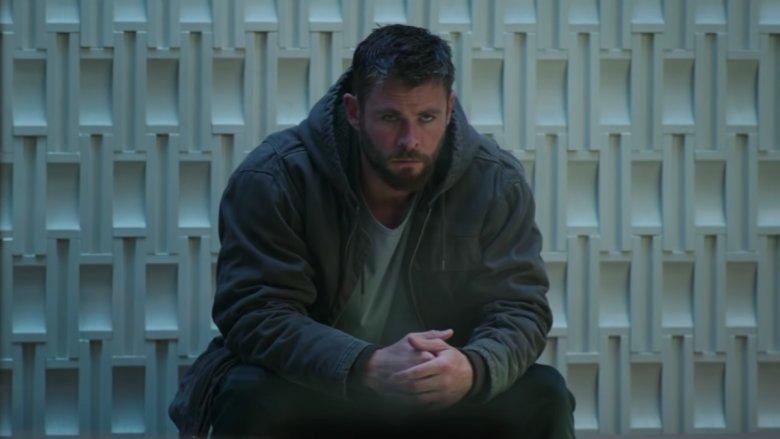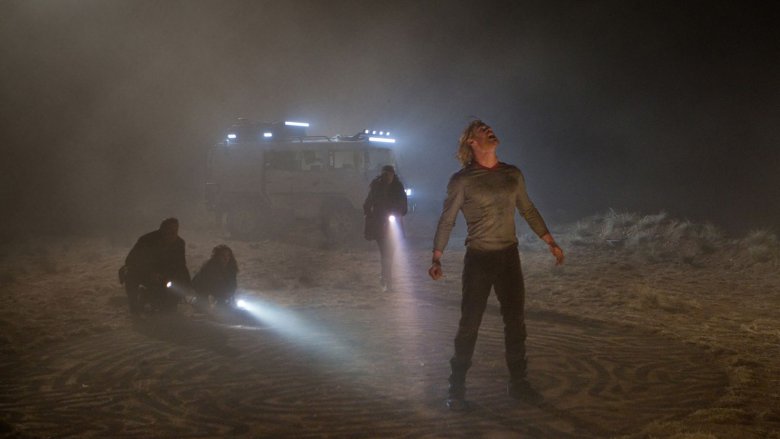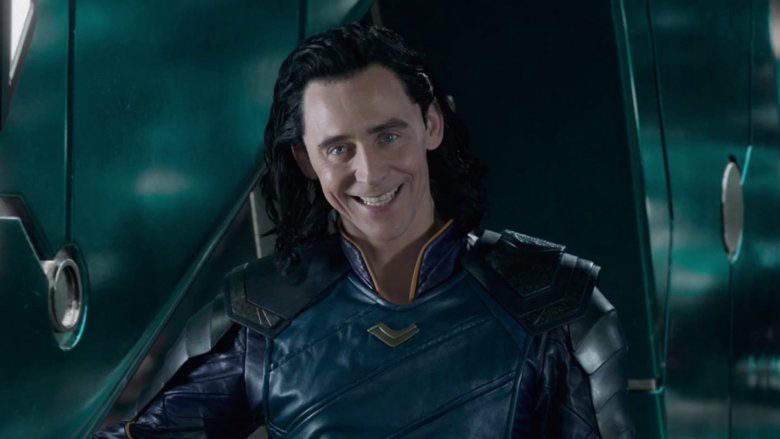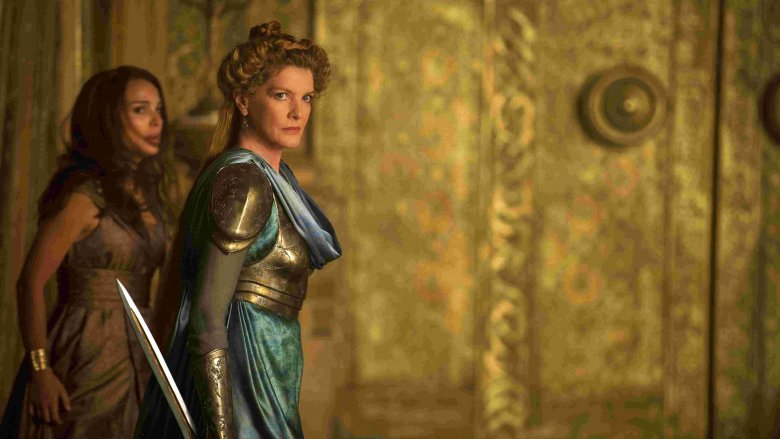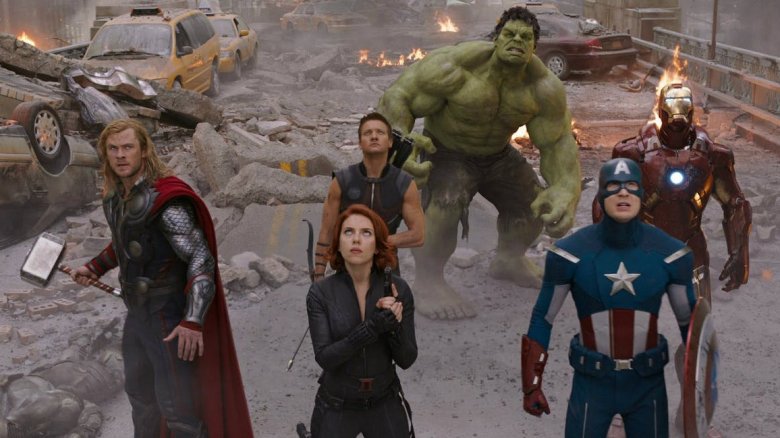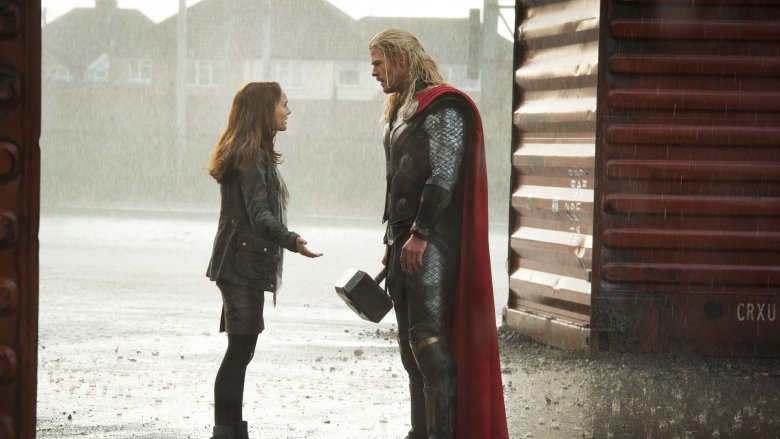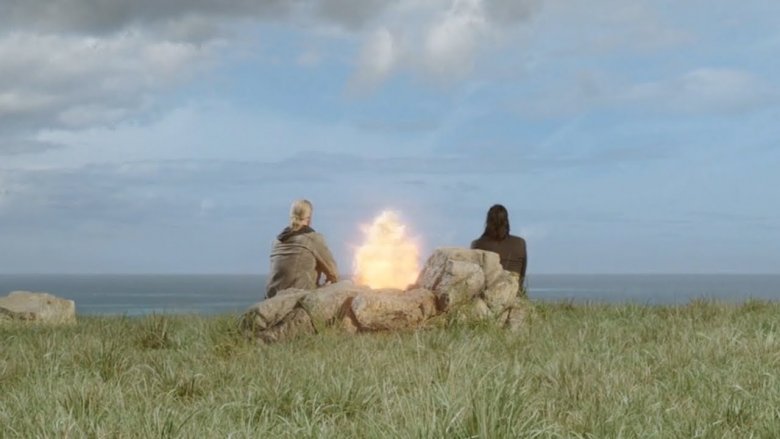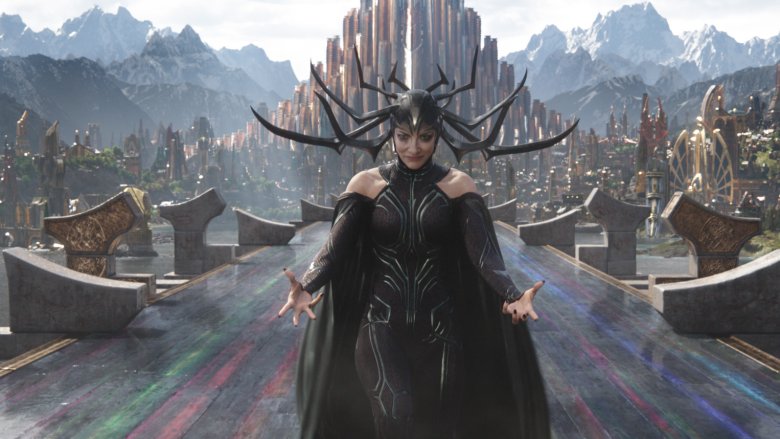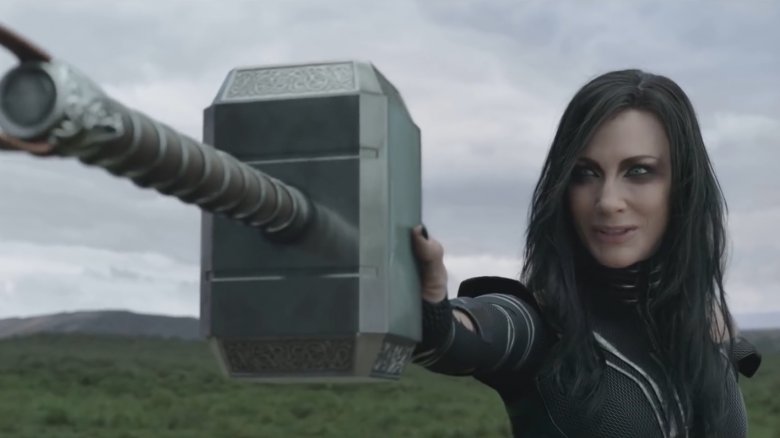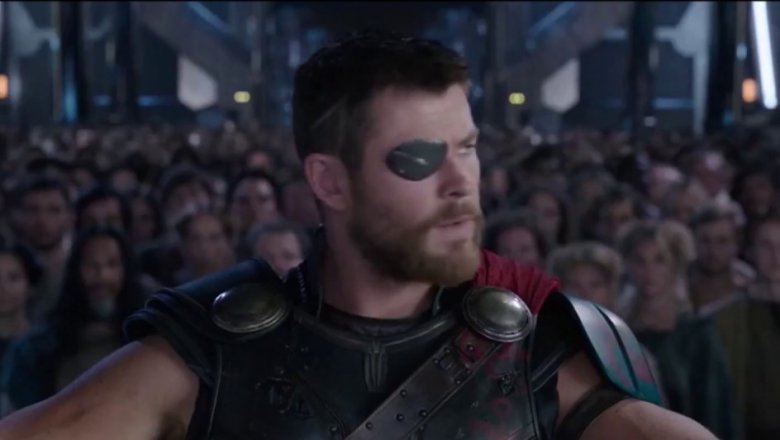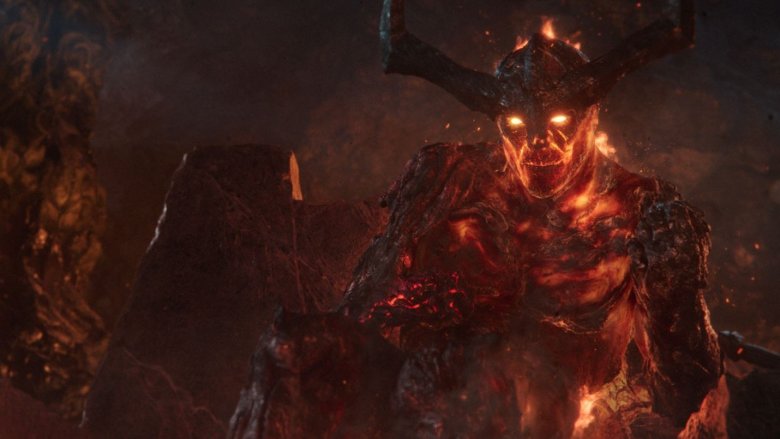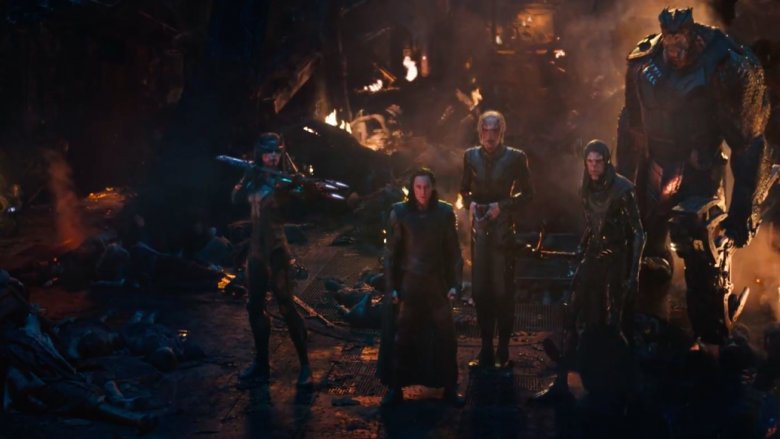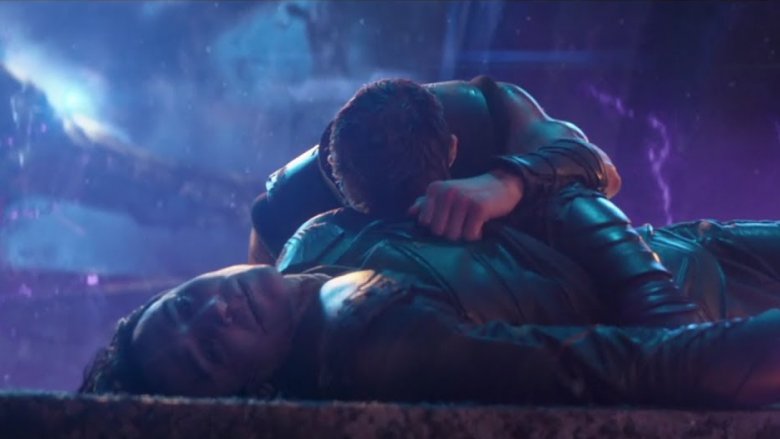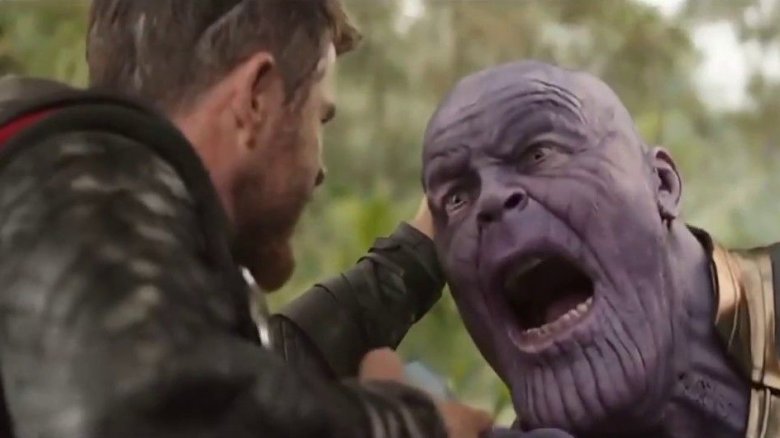All The Ways Marvel Has Tortured Thor
When the first trailer for Avengers: Endgame arrived, it practically broke the internet. Everyone was busy watching for clues about Tony Stark's interplanetary travails, Thanos' apparent retirement, Shuri's disappearance, and Scott Lang's re-emergence from the Quantum Realm. But there was another little cameo that has received very little discussion: the shot of Thor sitting alone, with a look of abject discouragement on his face.
While the trailer didn't give us much else to go on as far as the God of Thunder was concerned, what more needs to be said at this point? The quick glimpse sums it all up. Thor is really, and we mean really, depressed. And why not? When you add it all up, he's gone through a heck of a character arc throughout the MCU. While Odin's son may sport a smile a majority of the time and even laugh more often than most, the truth is, Marvel seems to have a bit of a vendetta against the newly minted King of Asgard — and as proof, here's a look at all the different ways the studio has managed to torture Thor thus far.
Exiled
Thor opened up with the god depicted as a brutish, headstrong warrior that always got what he wanted, even if it threw the Nine Realms into disarray. Disobeying his father, Thor led his companions in a vengeful attack on Jotunheim that ended with a timely rescue by Odin. While all seemed well for the moment, it didn't last. Perceiving Thor's pride, Odin proceeded to banish his own son and heir to Earth.
Thus the fateful character arc began, with Thor exiled to Earth, stripped of many of his powers, and unable to lift Mjolnir... for a while, at least. The rest of the film followed his adventures with Jane Foster, Erik Selvig, and even Clint Barton for a while, tracing his evolution into a wise, thoughtful leader that actually cares about the consequences of his actions. But even if he did manage to patch things up with Odin in the end, the fact still stands that the fella was literally banished by his own father. Rejection issues much?
Brother betrayal
Loki has been an interesting character during his time in the MCU. But while his personal loyalties have been in constant flux from the first moment he stepped onto the screen, there are a few things that Thor has always been able to count on from the God of Mischief. Chief amongst these is the trickster's affinity to betray his brother at a moment's notice.
Right from the get-go, Loki encouraged his brother to attack Jotunheim, even though he knew the consequences. But he didn't stop there. He also showed up while Thor remained a prisoner of S.H.I.E.L.D., spouting off a laundry list of lies about Odin's death and why his brother needed to remain in exile. The tale of deception continued in Avengers when Loki wreaked havoc on the Helicarrier before following it up by leading the Chitauri invasion of New York (even if he was possessed at the time). His backstabbing trend, though tempered by some genuine heroics as time went on, continued throughout Dark World and Ragnarok as Loki reveled in his brother's struggles, tricked him into thinking he was Odin, and watched from the best seat in the house while Hulk beat on his brother without mercy. Call it brotherly love, but Thor and Loki's relationship has been nothing but a source of stress for Thor since day one.
The loss of his mother
One of the unsung heroes of Asgard is Thor's mother Frigga. She's calm, tempered, loving, nurturing... and she can spar with Malekith one on one and defeat the dark elf without breaking a sweat. From her selfless care for both of her sons to her wise, talented leadership and support of the Allfather, Frigga was a pretty important presence in Thor's life. That is, until Marvel decided to up and kill her off in Thor: Dark World.
At that point, Thor had been doing pretty well. Sure, his father had exiled him previously, but he'd used that as a learning experience. Loki had betrayed him a few times too, but the trickster was safely ensconced in a cell in Asgard at the time. Jane Foster was even at his side for the moment — even if they were dealing with the fact that an Infinity Stone was stuck inside her. Then he had to suddenly deal with losing one of the only sources of unconditional love in his life. And, as it turned out, the hand of fate was just getting started. The loss of his mother was one of the initial truly tragic moments in Thor's personal story, as it signaled the first irrevocable separation that he had to endure. It wouldn't be the last.
PTSD from work
In the first movie of his franchise, Thor was a rambunctious warmonger that loved to stir up trouble if there was a chance to throw a little glory into the mix. Of course, one of his winning attributes as a hero in the MCU is the fact that he ultimately overcame this violent streak and instead began to use his extraordinary powers for the suppression of those with a more villainous mindset.
As he grew in wisdom, though, Thor began to experience some of the side effects of being one of the good guys. Starting with the mental and emotional effects from the Battle of New York and the first brush with Thanos' forces — an event that shook every one of the Avengers — each fight that Thor has gone through since seems to have continued to chip away at his constitution in one way or another. From helping to disintegrate meteor-size chunks of earth in Sokovia to fighting as a gladiator on Sakaar, Thor's work as an Avenger and a warrior of Asgard has certainly sobered his view on a good fight. All one has to do is compare his electrifying introduction as he arrived in Wakanda at the end of Infinity War to his jolly expression as he slew frost giants at the beginning of Thor to see the emotional toll that work has taken.
Jane Foster broke up with him
When the going gets tough, it's often helpful to draw close to our significant other. And for years, the woman who played that role for Odinson was none other than the preeminent astrophysicist and astronomer Jane Foster. She found Thor in his first solo film when her crew hit him with their van as he arrived in exile. Rough initial date aside, a romance bloomed, even if it had to shift into more of a long distance affair when Thor returned to Asgard.
Thor: Dark World continued to develop the relationship, showcasing the couple parading around Asgard, making eyes at each other, and looking every part the future king and queen of a great realm. But once the Aether was removed from Miss Foster, things never quite got back to normal. On the contrary, both of their occupations kept them apart more than ever. So what did Jane do? She went and dumped the guy who repeatedly saved both her planet and herself. As Ragnarok began, the disappearance of the franchise's chief female character was lightly glossed over with a quick comedic line about who broke up with who. But regardless of who's to blame, the breakup only added fuel to the tragic bonfire of his woes.
The death of his father
While their relationship may have been on the rocks from time to time (including that spell when Thor was exiled), Odin always had a tender spot for his fun-loving, tough-as-nails warrior son. He groomed him to be king and was a constant source of wisdom whenever Thor was getting too uppity about one issue or another.
So what did Marvel do with this beautiful father-son relationship? They destroyed it. As the early minutes of Ragnarok played out and the story started to build steam, one of the first casualties was none other than Thor's father. And we're not talking about a calm, bedside passing away, with time for tears and the processing of grief. Thor found his father wandering around Norway just in time to be given a warning lecture and then, poof! Odin disintegrated into a swirl of glittering sparks, blown away on the wind. And Thor didn't even have half a minute to get over that one before the next harrowing event began.
The other sibling
While Loki's shenanigans may have caused Thor endless anxiety over the years, the trouble created by the God of Mischief pales in comparison to that brought on by the return of Thor's older sister, Hela, to Asgard after Odin gave up the ghost. Literally coming on the heels of their father's death, Hela's release from her own exile — what is it with Odin exiling his children? — was hardly a relief for the grief-stricken Avenger. On the contrary, the Allfather's daughter entered the movie with nothing but revenge and conquest on her mind.
It took all of three seconds for Hela's relationship with Thor to go south, and throughout Thor: Ragnarok, she managed to inflict far more damage than anyone else in Odin's family tree. From usurping Thor's own right to be king to unleashing a reign of terror onto her new subjects, Hela only served to reinforce the apparent mantra that Thor's family life is just about as screwed up as it can get.
A weapon and an eye
Of course, trying to steal the throne and terrorizing Asgard were only part of the trouble that Hela's arrival produced for her little brother. The other side of the coin was a bit more personal in nature. In the very scene when she made her entrance in Norway, Hela decided to demonstrate her rather impressive abilities by catching Mjolnir mid-flight, preventing it from returning to its rightful owner. She then proceeded to crush it in her palm as if it was nothing more than a handful of Doritos.
While we all know that Thor would go on to replace the beloved weapon with Stormbreaker in Infinity War, we have to remember that hindsight is 20/20. At the moment, the loss of a companion that had been by his side through so many perils was a crushing blow. Hela also ended up being the one that blinded Thor, too, literally slashing his eye out as she toyed with him in one-on-one combat. While he, once again, eventually had his vision restored, there's no question that Thor's big sis was a bit of a bully throughout their brief relationship.
Kingly duties
Thor has had his hands full as an Avenger over the years, but that hasn't been his only priority. He was also a Prince of Asgard and was clearly being groomed by Odin to take up the mantle of the throne one day. While he began his story perfectly ready and willing to lead, by the end of Dark World, he had matured enough to understand the gravity of the office and even initially rejected the responsibility, preferring to focus on Jane Foster (even if she was about to dump him) along with his career as a warrior and Avenger.
But his brother's impish track record and his sister's repeated attempts to usurp the throne by force meant that when push came to shove, Thor was the only possible heir to the throne, or at least the only one with his head screwed on straight enough to handle the job. Thus, Thor found himself thrust into the responsibilities of being a king as well as an Avenger. While he may have initially been gunning for the job, by the time he received the crown, the demands of kingship ended up being more trouble and responsibility than anything else.
Ragnarok
During his first few MCU appearances, Thor's life onscreen was clearly a tragic saga of epic proportions — but by the end of Thor: Ragnarok, director Taika Waititi clearly felt that the loss of our hero's father, hammer, and eye, along with the issues of his antagonistic sister and the new burden of kingship weren't enough, so he decided to toss Ragnarok into the mix. After all, if you're already that low, how is a little apocalyptic world-ending drama going to make things that much worse?
The best part is that Thor himself had to come to the realization that unleashing Surtur and destroying the realm of Asgard was something that they hadn't just failed to prevent, it was something they had to do on purpose. While calling in the fiery demon to mop up the mess his sister had made was necessary in order to wrap up the story, it certainly doubled as a case of rubbing salt in Thor's already gaping and numerous wounds.
The loss of the Asgardians
But wait, there's more.
With Surtur and Ragnarok in the rearview mirror, Thor was still able to save what really counted: the people of Asgard themselves. With the survivors safe on his ship, Thor charted a course for Earth, where he planned to settle down and begin the restoration process. The only problem? When the mid-credits scene for Ragnarok rolled, it showed the Asgardians running straight into Thanos' forces.
Infinity War opened by showing Thanos and his minions on the ship with most of its occupants dead or dying. Heimdall was stabbed soon afterward, and the numerous bodies littering the floor bore testimony to the fact that Thor's desperate heroics and sacrifices in Ragnarok, done in the name of saving his people, were largely for naught. A cruel twist of fate? Perhaps. Or maybe it's just that Marvel vendetta at work yet again.
The loss of his brother
Over the course of time, Thor has been forced to witness the death of many of the people he loves. We're not talking about a policeman showing up at the door with bad news — he's actually had to look on and watch as his parents died and his people were slaughtered, including his friend Heimdall and then his own brother, Loki, both killed in front of him amidst the wreck and ruin of the last of his people.
The loss of Loki was a particularly severe blow, as his brother had been recently turning over a new leaf of sorts. In Dark World, he played an instrumental role in toppling Malekith, and he participated as a willing contributor in the downfall of Hela in Ragnarok. When he stood up to Thanos and was strangled to death as a consequence, it was too much for Thor to bear. In many ways it was the turning point for the King of Asgard, driving him on a one-track path of revenge for the rest of Avengers: Infinity War.
Didn't go for the head
At this point, the snowball effect of Thor's various calamities is clear. And it's no surprise that in Infinity War, directing duo the Russo brothers let Thor off the leash, allowing him to pour out his unadulterated rage on the one being in the universe that could take it: Thanos. But once again, the Marvel gods dealt a cruel blow during Thor's epic showdown with Thanos in Wakanda.
When the Mad Titan finally got his hands on all six Infinity Stones and prepared for his long-awaited snap of doom, the last gasp of resistance came courtesy of Thor — and what a gasp it was. In spite of Thanos' newly acquired power, Thor still managed to cut his way right through the blast of the Infinity Gauntlet, landing a solid blow to Thanos' chest. Only (let's say it all together now) he should have gone for the head. In a final twist of the back-stabbing dagger that has been Marvel's torturous treatment of Thor, the god mistakenly struck at the villain's big, purple chest, giving Thanos just enough time to turn back the clock and undo the blow — and just like that, half of the universe was gone.
While Endgame will certainly bring us some sort of resolution to the Thanos problem, an interesting sidebar to the whole universe-saving theme will be the burning question of whether Thor will finally find some peace and quiet from his tumultuous, pain-inducing adventures. Or will the calamities and misfortunes just keep on rolling? Could Marvel really be that cruel?
